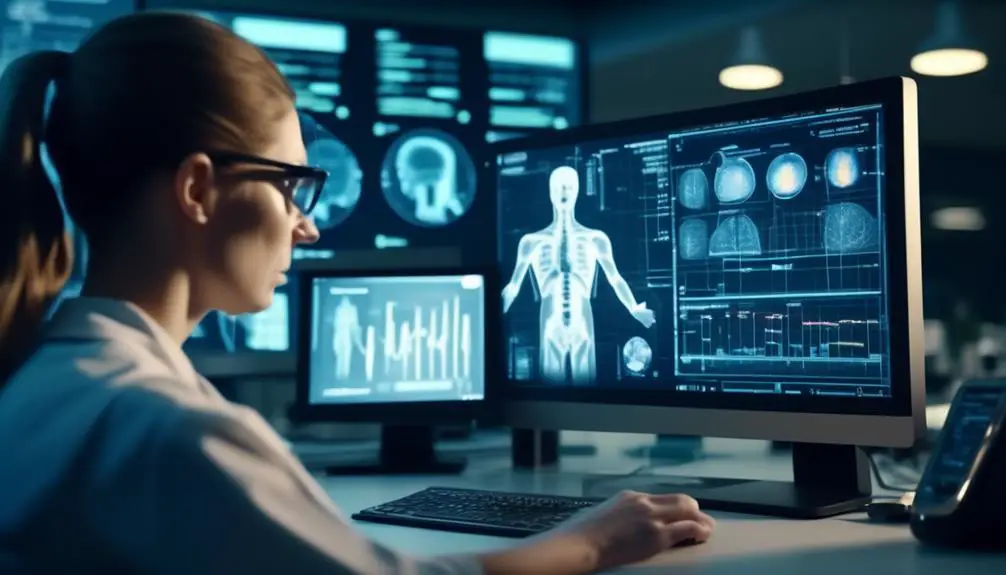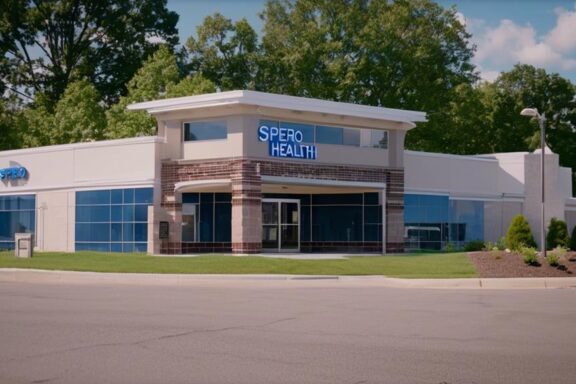Managing health records can be a challenging task, but it significantly impacts our healthcare experience. The way our health records are handled can truly make a difference in the quality of care we receive.
Cscc Health Records play a vital role in shaping the future of healthcare, and it's crucial to understand their significance in today's digital age.
As we navigate the complexities of medical record-keeping, there are various aspects to explore, from the benefits of accurate medical history to the efficient solutions they offer for healthcare providers.
Let's delve into the world of Cscc Health Records and uncover the ways they are revolutionizing the healthcare landscape.
The Importance of Health Records
The significance of health records lies in their ability to provide a complete picture of a patient's medical history and treatment. They're vital for improving communication among healthcare providers, ensuring that everyone involved in a patient's care is well-informed and able to make the best decisions. When health records are accurate and up-to-date, they become a crucial tool for sharing information and coordinating care, ultimately leading to better outcomes for patients.
Moreover, health records have significant legal implications. They serve as a documented history of a patient's medical treatment, which can be crucial in legal proceedings. Accurate and detailed health records aren't only essential for providing quality care, but they also serve to protect healthcare providers in the event of legal disputes.
Conversely, incomplete or inaccurate health records can have serious legal ramifications, potentially leading to litigation or other legal consequences.
Benefits of Accurate Medical History
Accurate medical history is crucial for receiving the right treatment. It helps prevent medication errors, enhances patient safety, and enables healthcare providers to make better treatment decisions.
When you have an accurate medical history, you increase the likelihood of receiving the most effective care for your condition. This is because healthcare professionals can tailor their treatment plans based on your specific medical background, ensuring that you receive the best possible care.
Better Treatment Decisions
Improving patient outcomes starts with having complete and accurate medical records. When healthcare providers have access to a patient's full health history, they can make better treatment decisions, leading to improved results.
Clinical evidence demonstrates that treatment plans based on a thorough understanding of a patient's medical history significantly increase the likelihood of successful outcomes. Accurate health records help avoid unnecessary procedures, reduce the risk of adverse drug interactions, and identify the most suitable treatment options for each patient.
This personalized approach not only enhances the overall quality of care but also builds trust and confidence between patients and healthcare professionals. Prioritizing the maintenance of accurate medical histories ensures that treatment decisions are tailored to meet each patient's specific needs.
Prevent Medication Errors
It's important to have complete and accurate medical records to make better treatment decisions and prevent medication errors. Healthcare providers can help prevent errors by comparing a patient's current medications with any new prescriptions, a process known as medication reconciliation.
Patient education is also crucial, as it helps individuals understand their medications, including potential side effects and interactions.
Reporting errors and improving healthcare systems can identify trends and issues leading to medication errors, allowing for targeted interventions to prevent future occurrences.
Improve Patient Safety
Improving patient safety is crucial for providing high-quality healthcare. One way to achieve this is by ensuring accurate medical history, which gives healthcare providers essential information to make well-informed treatment decisions. This not only reduces the chances of medical errors but also encourages patient involvement and facilitates effective care coordination.
Here's how accurate medical history contributes to enhancing patient safety:
- Clear Communication: Accurate medical history supports clear and straightforward communication between patients and healthcare providers, ensuring that crucial details aren't overlooked.
- Risk Identification: It allows healthcare providers to identify potential risks and customize treatment plans according to each patient's specific needs and medical history.
- Efficient Care Coordination: Accurate medical history streamlines care coordination among different healthcare professionals, ensuring a unified approach to patient care.
- Empowering Patients: It empowers patients to actively engage in their own care by providing accurate information and understanding the significance of their medical history.
Role of Technology in Record-Keeping
When health records are stored digitally, it brings many advantages. It makes the records more accessible and reduces the need for physical storage space.
It's vital to ensure strong data security measures to protect the confidentiality and integrity of patient information. Also, electronic health records can be retrieved quickly, leading to improved patient care.
Digital Storage Benefits
Digital storage technology has transformed the maintenance of health records, offering quick access and secure preservation of patient information. This has led to several advantages, including:
- Improved Accessibility: Healthcare providers can easily and swiftly access patient records, leading to better patient care and treatment outcomes.
- Cost Savings: Digital storage eliminates the need for paper-based records, reducing the expenses associated with printing, storing, and managing physical files.
- Enhanced Security: Digital storage systems provide advanced security measures to safeguard sensitive patient information, ensuring compliance with privacy regulations.
- Efficient Organization: Digitally stored health records can be organized and categorized more effectively, enabling healthcare professionals to locate specific information with ease.
These benefits underscore the positive impact of digital storage on health record management, benefiting both healthcare providers and patients.
Data Security Measures
Ensuring the security of patient health records is of utmost importance as digital storage becomes more prevalent. Implementing strong data security measures is essential to safeguard patient information and comply with privacy regulations. Our organization uses advanced cybersecurity measures to prevent data breaches and unauthorized access to sensitive health records. Patient information is encoded using data encryption, allowing only authorized personnel to access it. Access control mechanisms further restrict and monitor who can view or modify the records, enhancing the overall security of the system. These measures are vital in maintaining the integrity and confidentiality of health records, instilling confidence in patients and healthcare providers. Prioritizing data security demonstrates our commitment to upholding the trust placed in us by our patients and complying with stringent privacy regulations.
| Security Measure | Description |
|---|---|
| Data Encryption | Encodes patient information for secure storage |
| Access Control | Restricts and monitors access to health records |
Efficiency in Retrieval
In improving the efficiency of retrieving health records, our organization uses advanced technology to simplify record-keeping processes and enable quick access to crucial patient information. Here's how we accomplish this:
- Transition to Digital Records: We've moved from paper-based records to electronic health records, streamlining workflows and eliminating the time-consuming task of sifting through physical files.
- Enhanced Search Capability: Our system features advanced search functions for quick and precise retrieval of specific patient data, making processes more efficient.
- Integrated Systems: By integrating various health record systems, we've created a unified platform for accessing patient information, saving time and enhancing overall efficiency.
- Automation of Routine Tasks: We've implemented automated processes for regular tasks like appointment scheduling and prescription refills, freeing up valuable time for healthcare professionals to focus on patient care.
Digitizing Health Records
Healthcare providers are currently exploring the process of digitizing health records to improve accessibility and efficiency in healthcare management. Electronic management of health records allows for easy access to patient information, leading to more coordinated and effective care. By digitizing health records, healthcare providers can quickly retrieve essential patient data, reducing the risk of errors and improving the overall quality of care.
In addition to streamlining healthcare management, digitizing health records also raises important concerns about patient privacy. It's crucial to ensure that electronic health records are securely stored and only accessible to authorized personnel. Robust security measures, such as encryption and strict access controls, must be in place to safeguard sensitive patient information.
Digitizing health records not only enhances the efficiency of healthcare delivery but also plays a vital role in protecting patient privacy. As we continue to embrace digital solutions in healthcare, it's essential to prioritize the security and confidentiality of patient records. With the right protocols in place, electronic management of health records can revolutionize the way healthcare is delivered while maintaining the highest standards of patient privacy.
Managing Test Results and Treatment Plans

Efficiently managing test results and treatment plans is crucial for providing quality healthcare and ensuring favorable patient outcomes.
Within our healthcare system, patient engagement and remote monitoring play a critical role in achieving this objective. These practices enable close monitoring of patients' progress and timely adjustments to treatment plans, resulting in improved health outcomes and greater patient satisfaction.
Integrating telehealth further enhances this process by offering patients convenient access to healthcare professionals, fostering a sense of support throughout their treatment journey.
Personalized care tailored to individual patient needs ensures that treatment plans are effective and well-received.
Cscc Health Records' Impact on Individuals
Exploring the impact of CSCC Health Records on individuals reveals that effectively managing test results and treatment plans significantly influences patient experiences and outcomes.
Accessing and understanding our health records empowers us to take an active role in our healthcare journey, fostering a sense of ownership and control over our well-being. This, in turn, leads to better communication with healthcare providers and ultimately improved health outcomes.
However, privacy concerns arise alongside this empowerment, making the assurance of data security and confidentiality essential to maintain trust in the healthcare system and encourage individuals to proactively engage with their health records. This emphasizes the importance of privacy protection in health data management.
Additionally, active engagement with health records enables personalized and effective treatment plans, contributing to enhanced health outcomes.
Efficient Solutions for Healthcare Providers

Implementing streamlined electronic health record systems has significantly improved the efficiency of healthcare providers in managing patient information and treatment plans. These efficient solutions have transformed the way we deliver care, allowing us to focus more on our patients and less on administrative tasks.
Here are four key ways in which streamlined electronic health record systems have enhanced the efficiency of healthcare providers:
- Reducing paperwork: By digitizing health records, we've minimized the time spent on manual paperwork, enabling us to devote more time to patient care.
- Enhancing communication and collaboration: Electronic health records facilitate seamless communication and collaboration among healthcare team members, ensuring that everyone involved in a patient's care is well-informed and coordinated.
- Empowering decision-making: Access to comprehensive, real-time patient data has empowered healthcare providers to make well-informed decisions promptly, leading to better outcomes for our patients.
- Improving operational efficiency: Electronic health record systems have streamlined administrative tasks, such as scheduling and billing, allowing us to operate more efficiently and dedicate more time to patient interactions.
The implementation of streamlined electronic health record systems has revolutionized the way we deliver care, allowing us to provide our patients with the highest quality of service while optimizing our operational processes.
Frequently Asked Questions
How Does Cscc Health Records Ensure Patient Confidentiality and Privacy?
To maintain patient confidentiality and privacy, we obtain patient consent for data sharing and use strong data encryption methods. These measures create a secure environment for managing health records and protecting sensitive information. This is crucial in building trust and ensuring the safety of patients' personal data. For example, when a patient visits our healthcare facility, they can feel confident that their information is safeguarded and their privacy is respected. It's important to prioritize patient privacy to maintain the integrity of our healthcare services.
What Measures Does Cscc Health Records Take to Ensure the Accuracy and Integrity of Medical Records?
Ensuring the accuracy and integrity of medical records is essential for providing quality care. We involve patients in the process and carefully integrate data to ensure reliable information. This forms a strong foundation for a healthy community, contributing to better health outcomes.
Can Patients Access Their Health Records Through Cscc Health Records' Platform?
Yes, patients can easily access their health records through Cscc Health Records' platform. This access grants them the right to take control of their medical information, enabling them to be actively involved in their healthcare journey. This is important as it empowers patients to be more informed and engaged in their own care. By having access to their health records, patients can stay updated on their medical history, test results, and treatment plans, leading to better decision-making and improved communication with healthcare providers. This transparency and involvement in their health can ultimately contribute to better health outcomes and overall well-being.
How Does Cscc Health Records Handle the Integration of Different Healthcare Providers' Records Into a Cohesive System?
In handling the integration of different healthcare providers' records into a cohesive system, Cscc Health Records recognizes the challenges of interoperability. Our approach to data aggregation focuses on creating a unified platform for easy access to complete health records. This is important as it ensures that healthcare providers can seamlessly access and share comprehensive patient information, leading to better coordinated care and improved patient outcomes. By simplifying the process of integrating disparate records, we aim to provide a more efficient and effective healthcare experience for both providers and patients.
What Security Measures Are in Place to Protect Cscc Health Records From Cyber Threats and Data Breaches?
We focus on strong security measures to protect data. Staff receive cybersecurity training to enhance their awareness. Data encryption and access control play a crucial role in safeguarding our records. We continuously monitor audit trails to ensure transparency. These measures are essential for protecting against cyber threats and data breaches.
Conclusion
Cscc health records are essential for improving patient care and outcomes. By digitizing medical history and test results, healthcare providers can offer more efficient and personalized treatment plans. This leads to better health outcomes and provides peace of mind.
Your health records represent your well-being and should be managed with care and precision.







No Comments